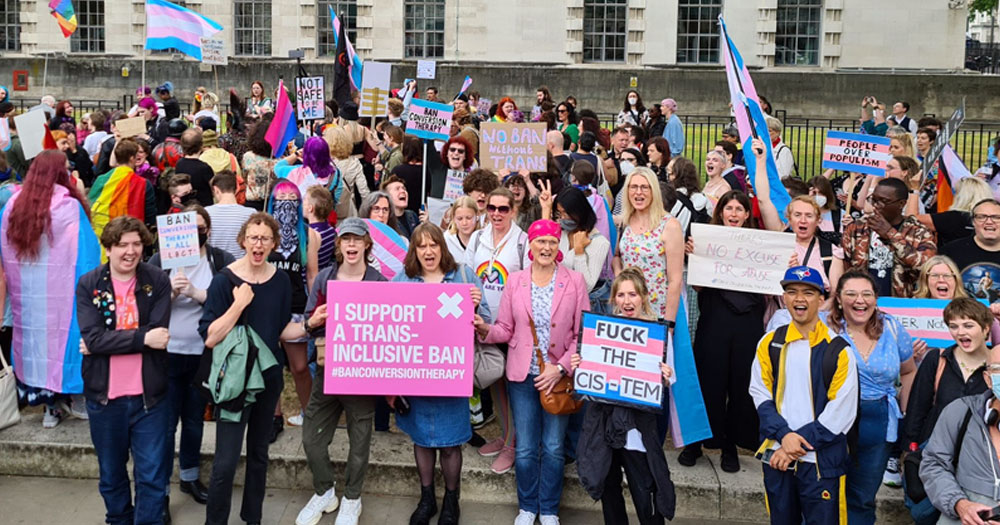Following months of outrage over the potential exclusion of trans people, the UK government has finally announced a conversion therapy ban that will “protect everyone”.
On Tuesday, January 17, UK Culture Secretary Michelle Donelan said that a new draft of the bill to ban conversion therapy will be published soon. The new legislation will outlaw all forms of so-called “conversion therapy” practices in England and Wales and in this new version, it will protect all LGBTQ+ people, including trans folks.
“We recognise the strength of feeling on the issue of harmful conversion practices and remain committed to protecting people from these practices and making sure they can live their lives free from the threat of harm or abuse.” Donelan said in a written statement.
She then added, “The legislation must not, through a lack of clarity, harm the growing number of children and young adults experiencing gender-related distress, through inadvertently criminalising or chilling legitimate conversations parents or clinicians may have with their children.”
Leni Morris, chief executive of LGBTQ+ charity organisation Galop, welcomed the proposed ban, saying she is glad to see trans people being included. Galop is an anti-abuse charity that also runs the National Conversion Therapy Helpline to support people who had experiences or are at risk of conversion therapy.
We work with victims and survivors who are experiencing conversion practices right now and our community deserves to be protected.
Read Galop's statement on the proposed conversion therapy ban ⬇️ pic.twitter.com/pg4bI2qNBS
— Galop (@GalopUK) January 17, 2023
Morris urged the UK government to bring “this vital piece of legislation” to parliament without delays, saying that there are “victims and survivors who are experiencing conversion practices right now and our community deserves to be protected”.
The announcement of the new ban was met with cautious responses from LGBTQ+ activists, given that the conservative government first promised to introduce such measures back in 2018, when Theresa May was Prime Minister. Later in 2022, then-Prime Minister Boris Johnson announced that the government would drop plans to introduce the conversion therapy ban in the UK only to U-turn later with a version of the ban that excluded trans people from its protection.
Thank you to the thousands of people who have already written to your MPs and signed the petition to #BanConversionTherapy for all. Together, we will work to achieve a ban that has:
✔️No more delays
✔️No excuses
✔️No loopholes— Stonewall (@stonewalluk) January 17, 2023
“Almost five years since the UK government first promised to ban conversion practices in 2018, we have faced delay after delay.” said Nancy Kelley, chief executive of Stonewall. “The UK government’s own National LGBT Survey shows that 13 per cent of trans people and seven per cent of all LGBTQIA+ people have undergone or been offered so-called conversion therapy. Our communities simply cannot face any further delays.”
While this announcement is positive news for the trans community living in the UK, they are still facing many challenges in the country. On the same day the conversion therapy ban was announced, the UK government decided to block the Gender Recognition Reform bill introduced in Scotland, which allows trans people to have their legal gender recognised through a self-declaration process.
We’re very disappointed by the High Court’s decision today that the long waiting times experienced by trans people seeking treatment are lawful. We don’t believe this is right – and will be appealing the judgment.
All the details ⬇️ https://t.co/QFnfxC4PIk
— Good Law Project (@GoodLawProject) January 16, 2023
Moreover, on January 16, a group of trans people lost a High Court case over waiting times for gender-affirming care in England. Claimants argued before the court that extended waiting times to access gender-affirming healthcare have been deemed discriminatory by gender dysphoria experts and that such waiting times were longer than for any other type of treatment offered by the National Health Service (NHS).
The judge ruled that the waiting times were “lawful” and that “NHS England is doing all it can reasonably be expected to do to reduce waiting times”. After the verdict, non-profit organisation Good Law Project announced that they will appeal the judge’s decision.
© 2023 GCN (Gay Community News). All rights reserved.
Support GCN
GCN is a free, vital resource for Ireland’s LGBTQ+ community since 1988.
GCN is a trading name of National LGBT Federation CLG, a registered charity - Charity Number: 20034580.
GCN relies on the generous support of the community and allies to sustain the crucial work that we do. Producing GCN is costly, and, in an industry which has been hugely impacted by rising costs, we need your support to help sustain and grow this vital resource.
Supporting GCN for as little as €1.99 per month will help us continue our work as Ireland’s free, independent LGBTQ+ media.
